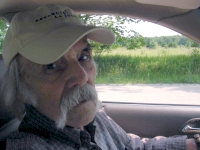
Poetry Dispatch No. 104 | September 26, 2006
Feature Poet of the Week: Ronald Baatz
“Poetry Dispatch” will occasionally feature a particular poet more than once in the course of a week. Usually a very active poet (prolific writing /publication). Always a poet whose work speaks to the reader immediately, honestly, in a real way.
I’ve been reading Ronald Baatz since the early numbers of one of the best, liveliest little mag publications in the country, Marvin Malone’s WORMWOOD REVIEW. Which was also one of the first publications to feature the poetry of Charles Bukowski — before he became Bukowski, Buk, and Chinaski. (The WORMWOOD REVIEW ceased publication some years ago upon the death of Malone. There’s been nothing like it before –or since.)
Here are two poems by Ronald Baatz for today, the first of this offering. One old (WORMWOOD REVIEW, 1995) and one brand new, which he’s generously offered to “Poetry Dispatch:”
It’s difficult to get any bio out of Baatz. The quote below, about as close as he comes: Norbert Blei

ONLY FOR THE OLD AND THE FRAGILE by Ronald Baatz
I don’t know why i want to live to be an old man,
but i find that i do. It seems odd to me, when i
really think about it. There isn’t much that
i want to accomplish. No major goals have made
themselves known to me. I can’t see my lazy self
solving any of the serious problems facing this race
of humans i’ve somehow become part of.
That sounds condescending, and i am sorry.
I want to love another woman, create more of
these poems, and like some other poets i know
drink many more glasses of wine.
At the end of it all, dying a gracious death
might prove to be a worthwhile act.
And just once i would like to be able to
charm the birds out of the trees.
I’ve heard it said that certain people can do this,
and these people are spoken of with very
noticeable envy. It’d be nice to convince
a good number of birds to come down
and land on my shoulders. If i were an
old man i would be thin and light
and these birds could pick me up and
carry me away. They would also be kind
enough to pick my wife up also.
We would float comfortably about in
the air like people in a painting
by Chagall. This would be something
to live to be an old man for.
I have no desire to accumulate
wealth; fame is completely out
of the question.
Just to be held aloft
by the birds would be plenty.
Birds only do this
for the old
and the fragile.
from Wormwood Review, #140, 1995


BREAKFAST WITH THE SHEEP by Ronald Baatz
On my way back from the supermarket, where i picked up
a coffee and hard roll, i drove up Cold Mountain Road, and
when i came to the Greek Orthodox community i stopped
the car to do some sheep gazing. It was obvious they were
newly shorn, in the cold morning air gathered tightly
around the one large tree that’s close to the barn. They
looked so skinny and as though they were shivering too.
But then i remembered it was only the cold of a June morning
and that just because i’d be shivering under that tree, if
i were standing there nude, it doesn’t mean a sheep would be.
Any sheep in decent health should be able to stay warm.
Maybe some old sheep would be shivering. But, what
do i know about sheep. Nothing. I can only stare at them
in wonderment. And they stare back at me, at least
the young ones do. Apparently the older ones can’t be bothered.
They took one look at me, saw me drinking coffee and
eating a hard roll, and they knew i was harmless. They know
i am alone, living alone, that i am lonely. They know
i am not one of those dumb poets who likes guns. They know
i’m one of those dumb poets who doesn’t like guns, who
played with them as a kid and then lost interest. Poets
are dumb like sheep. Why are we dumb like sheep?
Certainly not because we would go off to the slaughterhouse
as quietly and meekly as sheep. We would go kicking
and screaming like pigs. We want more time to remain alive,
to drink wine and muse about life, to write more poems, perhaps
that one poem bringing comfort and peace and a light to the world,
that one poem that is like a great undying prayer. And we
want to remain alive to experience more of the dumb silence of sheep.
Just to be dumb in silence and to look out the back door at night.
Look at the stars as though for the first time and experience the
profound dumbness they inspire. I like having breakfast with the sheep,
engine turned off as i sip and nibble, huddled against the steering wheel,
looking up at the sky when not at the sheep. Looking for that
omen bearing cloud telling me when i will have a woman again in my life.
The last woman. The one who will stand naked with me under the tree,
finally embracing one another in that dumb silence, each of us shivering
a little bit less.
for Poetry Dispatch # 1o4, first printing




 May Swenson (b. Anna Thilda May Swenson, May 28, 1913 in Logan, Utah – December 4, 1989 in Bethany Beach, Delaware) was an American poet and playwright.
May Swenson (b. Anna Thilda May Swenson, May 28, 1913 in Logan, Utah – December 4, 1989 in Bethany Beach, Delaware) was an American poet and playwright.




























































Recent Comments